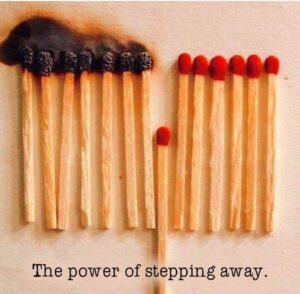It seems to me – based on my work as a conflict management coach and, well, just as myself – that one of the things that leads to interpersonal conflict is when we have expectations of another. It might have to do with how we interact on a day-to-day basis, how we treat one another privately and publicly, how we communicate when in conflict, how we support each other, or whether our values and needs are compatible. Further, we might expect someone to support us in a matter, to acknowledge something we did for them, to care for us when we are not well or unhappy, to meet our needs, to recognize our good deeds, to trust us, to respect our decisions and reasons we acted in certain ways, and so on. The list is endless!
It is worth considering this variable when we find ourselves reacting to these and other sorts of circumstances. Exploring our affirmative answer to the question, “Am I reacting because of unmet expectations?”, will make it easier to understand what we needed and ultimately, easier to articulate that to the other person. Taking a look, too, at our related reactions helps us do so. Indicators may be if we are feeling disappointment, betrayal, dismissed, ignored, not trusted, that we and our needs are not taken seriously, and many other emotions that reflect that we are let down by what the other person said or did or didn’t say or do.
How we manage situations and the range of feelings we experience will differ depending on variables such as the length and nature of our relationship, our needs and values and beliefs, influences from our upbringing, how we are feeling at the time, the amount of stress in our lives, our general state of health and well-being, and so on.
This week’s Conflict Mastery Quest(ions) blog is about this topic and you are invited to consider an interpersonal dispute in which you experienced unmet expectations in the situation and emotions that reflect that as you answer the following:
- What is the situation?
- What did the other person say or do, or not say or do, that had an adverse impact on you? How might you describe the impact on you?
- What, more specifically, did you expect of that person that they didn’t deliver on?
- What makes the aforementioned expectation especially important to you?
- What reasons are you attributing to the other person for what they said or did or didn’t say or do?
- What excuses have you made for the other person – such that you are inclined to let the situation go without voicing your expectations, if that is what you are doing?
- What do you know for sure about the other person’s motivation for not meeting your expectations? What don’t you know about their motivation?
- What is your fear, worry, concern about letting the other person know, if you are reticent to tell the other person?
- What advantages are there to raising the matter? What are the disadvantages?
- What are your expectations of yourself in this matter?
- What else occurs to you as you consider these questions?
- What insights do you have?
(Popular- from the archives)



 “You just need enough bravery for the next step, not the whole staircase”
“You just need enough bravery for the next step, not the whole staircase” I found this picture to be so poignant. It made me think of how combustible interpersonal disputes can be – literally – and how the toxicity and negativity can spread so easily. And the spread is not just to the other person in the dispute. But, it is also to anyone who might be near, who might overhear the heated exchange, who might listen reluctantly or even with interest as the people in dispute convey what happened in their perceptions, or it might be anyone else who is otherwise impacted by the dispute.
I found this picture to be so poignant. It made me think of how combustible interpersonal disputes can be – literally – and how the toxicity and negativity can spread so easily. And the spread is not just to the other person in the dispute. But, it is also to anyone who might be near, who might overhear the heated exchange, who might listen reluctantly or even with interest as the people in dispute convey what happened in their perceptions, or it might be anyone else who is otherwise impacted by the dispute.